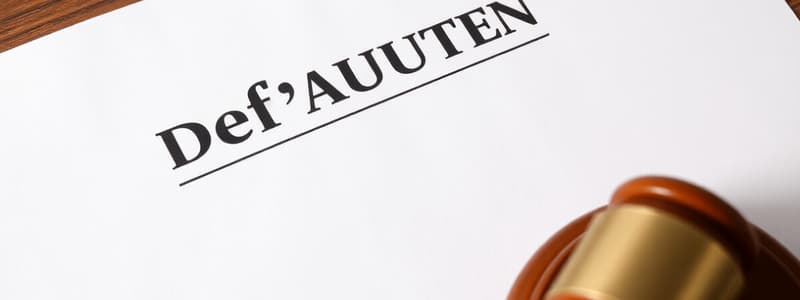Podcast
Questions and Answers
At what age do individuals in Scotland attain contractual capacity under the Age of Legal Capacity (Scotland) Act 1991?
At what age do individuals in Scotland attain contractual capacity under the Age of Legal Capacity (Scotland) Act 1991?
- 21
- 16 (correct)
- 14
- 18
What is the legal status of contracts entered into by children under the age of 16?
What is the legal status of contracts entered into by children under the age of 16?
- Void ab initio (correct)
- Valid until challenged
- Enforceable with consent
- Voidable
What should a person contracting with a 16-17 year old do to protect themselves in a prejudicial transaction?
What should a person contracting with a 16-17 year old do to protect themselves in a prejudicial transaction?
- Obtain approval from a guardian
- Ratify the transaction (correct)
- Notify the court
- Submit a written agreement
What kind of adult is considered to lack capacity to enter contracts?
What kind of adult is considered to lack capacity to enter contracts?
What type of unlawful influence would make a contract void?
What type of unlawful influence would make a contract void?
In the context of overcoming a person's will in contract law, what does the case 'Earl of Orkney v Vinfra' primarily address?
In the context of overcoming a person's will in contract law, what does the case 'Earl of Orkney v Vinfra' primarily address?
What occurs when a benefit passes under a void agreement?
What occurs when a benefit passes under a void agreement?
Which of the following is NOT a necessary element for establishing a case of facility and circumvention?
Which of the following is NOT a necessary element for establishing a case of facility and circumvention?
Which of the following grounds can negate consent in a contract?
Which of the following grounds can negate consent in a contract?
What is the outcome when a contract is successfully challenged on the basis of being void?
What is the outcome when a contract is successfully challenged on the basis of being void?
Which condition must be met to avoid a voidable contract?
Which condition must be met to avoid a voidable contract?
What happens to third party rights when A sells to B under a void contract?
What happens to third party rights when A sells to B under a void contract?
In the case of Morrison v Robertson, what was the main issue regarding the contract?
In the case of Morrison v Robertson, what was the main issue regarding the contract?
What is the main difference between a void contract and a voidable contract?
What is the main difference between a void contract and a voidable contract?
What does 'restitutio in integrum' refer to in the context of voidable contracts?
What does 'restitutio in integrum' refer to in the context of voidable contracts?
What was a significant outcome in the case of Macleod v Kerr?
What was a significant outcome in the case of Macleod v Kerr?
Which of the following correctly describes a void contract?
Which of the following correctly describes a void contract?
What is one of the conditions for a contract to be considered voidable?
What is one of the conditions for a contract to be considered voidable?
In the context of contract law, what does 'undue influence' refer to?
In the context of contract law, what does 'undue influence' refer to?
Which statement is true regarding mistaken consent due to misrepresentation?
Which statement is true regarding mistaken consent due to misrepresentation?
What happens to the rights of third parties when A sells to B under a voidable contract with them?
What happens to the rights of third parties when A sells to B under a voidable contract with them?
Under which circumstances can a voidable contract be avoided?
Under which circumstances can a voidable contract be avoided?
What legal status does a contract attain once a successful challenge is made based on lack of capacity?
What legal status does a contract attain once a successful challenge is made based on lack of capacity?
What was established from the case of Morrison v Robertson?
What was established from the case of Morrison v Robertson?
What legal capacity do individuals under the age of 16 have in terms of entering contracts?
What legal capacity do individuals under the age of 16 have in terms of entering contracts?
Under which circumstances can individuals aged 16-17 protect themselves in case of prejudicial transactions?
Under which circumstances can individuals aged 16-17 protect themselves in case of prejudicial transactions?
What determines if a contract is void due to facility and circumvention?
What determines if a contract is void due to facility and circumvention?
Which of the following groups lack the capacity to enter into contracts?
Which of the following groups lack the capacity to enter into contracts?
What is the effect of a contract being affected by force and fear?
What is the effect of a contract being affected by force and fear?
Which situation qualifies as a prejudicial transaction under the Age of Legal Capacity (Scotland) Act 1991?
Which situation qualifies as a prejudicial transaction under the Age of Legal Capacity (Scotland) Act 1991?
What happens to benefits passed under a void contract?
What happens to benefits passed under a void contract?
Which scenario does NOT contribute to establishing facility and circumvention?
Which scenario does NOT contribute to establishing facility and circumvention?
Flashcards
Void Agreement
Void Agreement
A contract that is considered invalid from the very beginning and has no legal effect.
Voidable Agreement
Voidable Agreement
A contract that is initially valid but can be made invalid by one of the parties later.
Lack of Capacity
Lack of Capacity
A situation where one party lacks the legal ability to enter into a contract.
Unlawful Contract
Unlawful Contract
Signup and view all the flashcards
Defective Consent
Defective Consent
Signup and view all the flashcards
Restitutio in Integrum
Restitutio in Integrum
Signup and view all the flashcards
Third Party Rights
Third Party Rights
Signup and view all the flashcards
Morrison v Robertson
Morrison v Robertson
Signup and view all the flashcards
Macleod v Kerr
Macleod v Kerr
Signup and view all the flashcards
Contract Ratification
Contract Ratification
Signup and view all the flashcards
Capacity to contract
Capacity to contract
Signup and view all the flashcards
General capacity rule
General capacity rule
Signup and view all the flashcards
Exceptions to general capacity rule
Exceptions to general capacity rule
Signup and view all the flashcards
Child's capacity
Child's capacity
Signup and view all the flashcards
Void contract of a minor
Void contract of a minor
Signup and view all the flashcards
Prejudicial transaction
Prejudicial transaction
Signup and view all the flashcards
Incapable adults
Incapable adults
Signup and view all the flashcards
Force and Fear
Force and Fear
Signup and view all the flashcards
Facility and Circumvention
Facility and Circumvention
Signup and view all the flashcards
Unjustified enrichment
Unjustified enrichment
Signup and view all the flashcards
Grounds of Challenge
Grounds of Challenge
Signup and view all the flashcards
Contract Void
Contract Void
Signup and view all the flashcards
Contract Voidable
Contract Voidable
Signup and view all the flashcards
Error & Misrepresentation
Error & Misrepresentation
Signup and view all the flashcards
Who can enter contracts?
Who can enter contracts?
Signup and view all the flashcards
At what age can someone enter a contract?
At what age can someone enter a contract?
Signup and view all the flashcards
What happens if a minor enters a contract?
What happens if a minor enters a contract?
Signup and view all the flashcards
Can a 16-17 year old be protected?
Can a 16-17 year old be protected?
Signup and view all the flashcards
What if someone is under the influence?
What if someone is under the influence?
Signup and view all the flashcards
What is force and fear?
What is force and fear?
Signup and view all the flashcards
What is facility and circumvention?
What is facility and circumvention?
Signup and view all the flashcards
What if a benefit was already passed?
What if a benefit was already passed?
Signup and view all the flashcards
Study Notes
Defective Agreements
- Agreements can be challenged if there are defects in the consent given by one or both parties.
- Grounds for challenge include:
- Lack of capacity of one party: This negates consent.
- Unlawful contract: A contract that is against the law. Refer to W&B 12-01 – 12-23 for details.
- Defects in consent: Consent induced by force or fear.
- Consent given while facile (easily influenced) or by circumvention.
- Consent given under undue influence.
- Mistaken consent: This includes errors and misrepresentations.
Effect of Successful Challenge
- A successful challenge can result in a contract being either void or voidable.
- A void contract is no longer valid and has no legal effect from its creation. This means no rights or duties are created or transferred. Additionally, there is no legal basis for third parties to act upon the agreement.
- A voidable contract is valid until avoided. The contract must be avoided with appropriate conditions:
- Restitution (putting things back to the original state) must be possible.
- No unreasonable delay in seeking to avoid the contract.
- The rights of any third parties must not be affected.
- The contract must not have been ratified under relevant laws or affirmed by either party (ALCSA 1991 or RWSA 1995).
Third Party Rights
- A sells something to B under a void contract. B then sells the same thing to C. C does not acquire ownership, and A can recover the item from C.
- A sells something to B under a voidable contract. B sells the item to C before A avoids the original agreement. C acquires ownership. A cannot recover the item from C.
- This assumes C purchased the item in good faith, without knowledge of the defect in A and B's agreement.
Third Party Rights (Case Examples)
- Morrison v Robertson: M mistakenly assumed he was contracting with Wilson, not T. The contract with T was void due to a mistake in identity. M could recover the cows from R.
- Macleod v Kerr: The contract between K and G was potentially voidable (not void), but could not be avoided as the car was resold, preventing restitution.
Capacity
- General rule: All natural and legal persons have capacity to enter contracts.
- Exceptions: Children, incapable adults, intoxicated, and enemy aliens lack capacity to enter contracts. Contracts entered into by these parties are void.
Capacity: Children
- Age of Legal Capacity in Scotland (1991): contractual capacity attained at age 16 for most cases, however contracts entered into by those under 16 are generally void (initially void)
- Law provides some protection to those aged 16 or 17 for prejudicial transactions.
- Persons aged 16 or 17 who contract with someone from this age group may gain protection through ratification of the contract.
Capacity: Others
- Incapable adults: Their affairs are managed by guardians or through power of attorney as determined by the Adults with Incapacity (Scotland) Act 2000.
- Intoxicated persons: Lack capacity when beyond the ability to reason.
Benefit Passed under Void Agreement
- Any benefit transferred under a void agreement can be recovered through unjustified enrichment. Cases showing this include "Morgan Guaranty Trust Co of New York v Lothian RC" and "Cantiere san Rocco SA v Clyde Shipbuilding & Engineering Co Ltd."
Force and Fear
- A contract is void if affected by force or fear.
- Force or fear must be sufficient to overcome the will of a reasonable person.
- Earl of Orkney v Vinfra: Threat of immediate violence.
- Hunter v Bradford Property Trust Ltd: Threat of lawful action.
- Hislop v Dickson Motors: Other threats can also demonstrate force or fear.
Facility and Circumvention
- A contract made when a party is in a weakened state of mind (facile) and influenced by others (circumvention) or coercion is voidable. This includes if they suffered loss due to entry into the contract.
- McGilvary v Gilmartin: Example of facility and circumvention.
Undue Influence
- A relationship of influence and trust between parties can lead to an inferred voidable contract if a benefit is given that unfairly affects one party
- Gray v Binney: Undue influence.
- Key elements:
- Relationship of trust;
- Unfair advantage taken.
- Lack of independent advice from the weaker party;
- Material benefit to stronger party.
Error and Misrepresentation
- This is a separate area for further study.
Studying That Suits You
Use AI to generate personalized quizzes and flashcards to suit your learning preferences.




